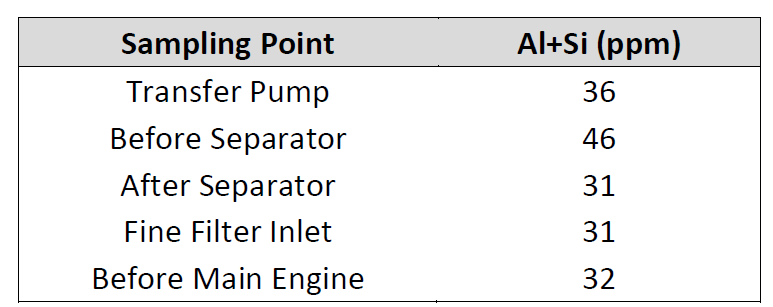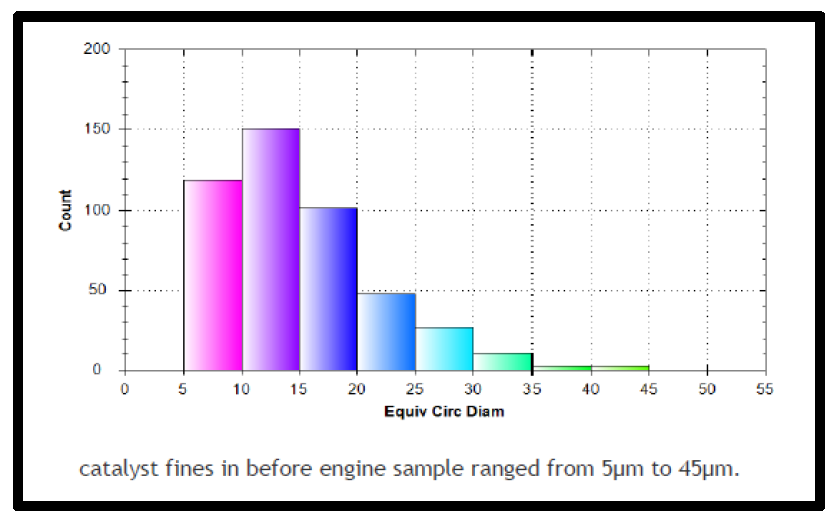VPS Talks: Damage Prevention
By Josephine Goh, VPS Sales Manager, Singapore
Save more money by protecting your assets
Preventing damage is better – and less expensive – than curing it.
At VPS, we have often seen that problems such as engine failure, fuel pump failure and liner wear, could have been prevented by implementing a proper fuel management programme.
‘Main engine damage is an expensive category of claims that occurs far too frequently. Statistically a vessel will suffer between one and two incidences of main engine damage during its lifetime. With an average claims cost of around USD 650,000.’ Swedish Club’s Loss Prevention Supplement
One of the most important, yet often overlooked processes, is that of regular Fuel System Checks (FSCs) to help assess onboard purifier performance and the efficient removal of aluminium and silicon catalytic fines within fuel.
The presence of ‘cat-fines’ can be extremely damaging, causing rapid engine-part wear. Therefore, monitoring cat-fine levels before they can enter vessel engines, can prevent such damage. This will also help comply to engine manufacturers’ recommendations of a maximum 10-15 ppm level of cat fines present in the fuel entering the engines.
In addition, periodic sampling from the fuel treatment system will also identify problems such as water ingress from ballast systems, leaking heating coils and cargo contamination. After all, the last thing you want to see is that your purifier is working as a pump.
Our proactive approach in practice – case study
This is a case concerning a 26,528 dwt LPG Tanker. The vessel bunkered High Sulphur Fuel Oil [HSFO] in Fujairah, where its fuel met the International Marine Fuel Standard ISO 8217 specifications.
So far, so good. However, after using the bunkered fuel, the Chief Engineer reported a main engine expansion tank low level alarm trigger, and that the main exhaust gas temperature was high on cylinder units 2 and 4. The vessel then commenced a gradual slowdown of the main engine. The Chief Engineer reported the vessel was unable to run the engine due to suspected leaks from its main cylinders.
Consequently, the vessel drifted for about 10 hours before finally dropping anchor off the coast of India.
Upon dismantling the engine, the following findings were made:

Upon receiving this information, the VPS Technical Advisor recommended fuel system samples be submitted. The results indicated that the purifier was, in fact, only working like a pump.

The screening size of Al+Si [on the before engine sample] further confirmed why the vessel was experiencing problems as the size of Al+Si ranges from 5-45 µm.

These discoveries were greatly appreciated by the vessel’s Chief Engineer and ship owner, as they could now understand the cause – and potential cost – of the problem. They subsequently ordered routine fuel system check (FSC) sampling to prevent a recurrence of the incident.
The vital importance of fuel system checking
The International Marine Fuel Standard, ISO8217:2017, states the specification limit for cat-fines is 60ppm for fuel delivered to the ship. Should a ship’s purifiers be working at an efficiency of 75%, then as an example, they would remove 45ppm of any fuel containing cat-fines at the specification limit of 60ppm. This would result in a maximum 15ppm catfines passing through to the engine, matching the OEM operational advice.
A regular FSC programme, is a simple, yet effective solution for evaluating onboard fuel treatment efficiency, as:
- Efficient fuel treatment is important for fuels close to the maximum quality specification
- A tool to sound the skills of the engineers, on how effectively the plant is running over a period of time and by different engineers
- It identifies problem areas in the tank system or fuel treatment plant
- It gauges the effectiveness of current fuel treatment maintenance and servicing schedule
- It establishes a monitoring routine for achieving extended Time Before Overhaul (TBO) – saving costs and reducing maintenance needs
- It quickly identifies the search during a damage situation
- It reduces machinery damage and saves money in overhauls and other costs
This value of the VPS FSC Testing Programme
The highlighted case study shows the critical importance of regular and thorough fuel system checks. Such checks, when carried out routinely, can significantly mitigate the risks associated with elevated cat-fine levels within fuel and identify inefficient purifier performance.
It has been proven that the VPS FSC programme can reduce fuel system failures by 50%, saving hundreds of thousands of dollars in repair costs.
To find out more about how we can help you with your fuel management, please contact Josephine Goh at josephine.goh@vpsveritas.com
 Search
Search
 Customer
Customer